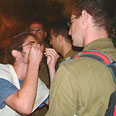
Settler faces soldier in Neve Dekalim
צילום: אילן מרסיאנו
The people's army?
IDF's dignity took a beating during disengagement
Colonel Roni Numa, commander of the Nahal brigade, is a member of a small group of commanders who have carried the IDF's counter-terror operations in the territories since September 2000 on their shoulders.
When the intifada broke out, Numa commanded the elite Shaldag unit. Since then, he headed the paratroop 202 battalion (during operation Defensive Shield,) the Binyamin brigade that saw plenty of action, and the Nahal brigade for a year now.
Five years and countless operations. Even when he got married, he didn't take a real vacation. Indeed, no generation of army commanders has known such period of constant fighting.
Numa, a pleasant officer in his manners and bold in battle, barely missed a day of combat.
Last Tuesday, in the harsh afternoon heat, Numa stood by a house, marked as number 437 on IDF aerial photos, in the now-evacuated northern West Bank settlement of Homesh. The people he was facing were very familiar to him: Moshe and Tzipi Harmelech, whose son Shuli was killed in a shooting attack two years ago. Shuli's widow, Limor, and his brother, Roee, were also there.
The attack happened in the area under the responsibility of the Binyamin brigade, during the period Numa headed it. He visited the family several times. Moshe and Tzipi Harmelech specifically asked him to get to Shuli and Limor's home before it was evacuated.
For 40 minutes, Numa sustained a scathing verbal assault from the Harmelech family.
"I know you and know how difficult it is for you, and that's why I asked that you're the man who evacuates us," Moshe Harmelech told him. Limor, however, who was accompanied throughout the evacuation day by a crew of video cameramen, objected to Numa being the person who evacuates her family.
"I don’t want him in my home," she said. "He ruined my life once already."
Meanwhile, Roee delivered a lengthy ideological speech. He charged soldiers with being partners to historical betrayal, an immoral act the likes of which has not been since the destruction of the Temple.
Numa stood there, his face frozen in the intense heat. At times he spoke briefly, but most of the time he remained silent.
Police could have carried out evacuation without IDF
As opposed to most of those evacuated from Homesh, who appeared to be participating in a strange theater show, one could not doubt the power or authenticity of the Harmelech family's sorrow.
The ideological reasoning it provided, many of it substantive, certainly merits a debate. There was only one problem: Colonel Roni Numa cannot be the one who engages in this debate. On the other hand, it was simply impossible, painful even, to see him standing there and taking the insults.
Those who placed the IDF at the forefront of evacuation knew this was exactly what was going to happen. The IDF is not just another professional organization: It's the people's army. All of us or our children serve there, we all feel it belongs to us.
Indeed, nobody blasted police officers as "traitors," nobody said they were shaming their uniform. Whoever placed the army at the forefront knew its prestige would decide this battle, the same way this prestige served for dozens of years to camouflage the destructive settlement enterprise, with the cooperation and under the protection of the army.
This may be retrospective wisdom, but those who planned it all were supposed to know the police would be enough to carry out the evacuation. The placing of soldiers in the forefront created last week countless similar images: Senior officers and young soldiers sustaining insults and assaulted both verbally and physically.
The public lauded their sensitivity, the images helped create bitterness towards the evacuees, but those who paid the price were the uniform-wearers.
When it was all over, Moshe Harmelech broke into tears, on Roni Numa's shoulder. The brigade commander hugged him and remained silent. Later he finalized with him how the family will be evacuated, and moved on.
The "sensitivity and determination" policy achieved another victory. Yet Roni Numa's dignity, the honor of his uniform and service, and the need to prevent those 40 humiliating minutes from him, who will save those?










